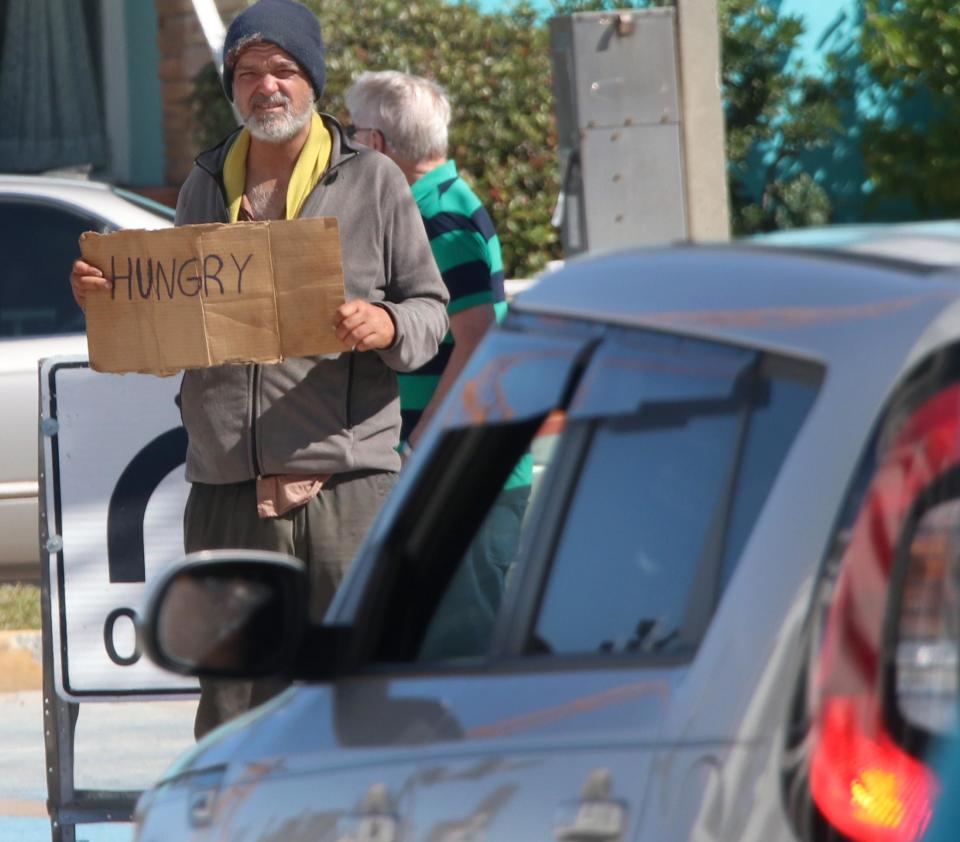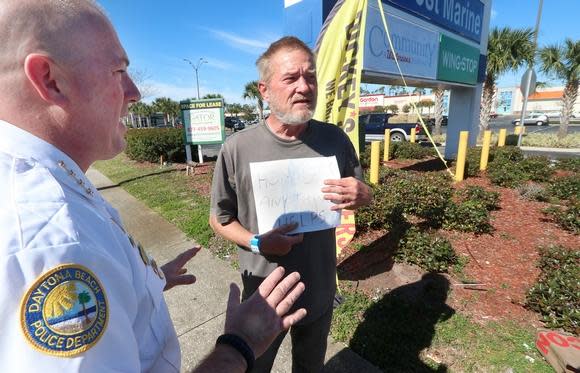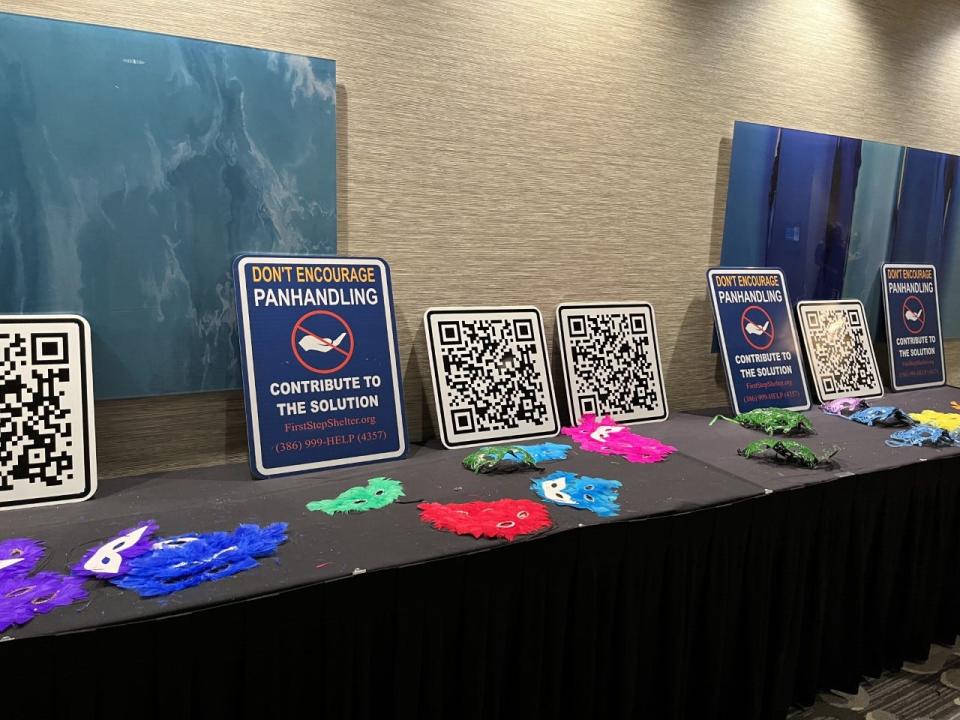Judge blocks Daytona Beach's strict panhandling ordinance on First Amendment grounds
DAYTONA BEACH - A U.S. District judge has issued a preliminary injunction that will at least temporarily block enforcement of Daytona Beach's panhandling ordinance that's been in place for four and a half years.
A federal lawsuit filed against the city in November last year argues that the city's panhandling law violates First Amendment rights to freedom of expression.
Four men are named as plaintiffs in the lawsuit challenging Daytona Beach's panhandling regulations that since February 2019 have allowed police to charge $200 fines and arrest people who solicit in outlawed areas, beg after the sun goes down, or try to cajole people in ways deemed to be overaggressive.

U.S. District Judge Wendy Berger issued the preliminary injunction. The lawsuit brought by the Southern Legal Counsel and pro bono attorneys Sabarish Neelakanta and Paul George seeks to make the injunction permanent.
Southern Legal Counsel is a statewide, nonprofit law firm that aims to ensure fairness, social justice and government accountability for Floridians through high-impact initiatives, policy advocacy and civil litigation.
The lawsuit, filed in the Orlando Division of the U.S. District Court for the Middle District of Florida, seeks a permanent injunction against enforcement of the ordinance, a declaration that the challenged provisions are unconstitutional, and damages on behalf of plaintiffs Dennis Scott, Chad Driggers, Douglas Willis, and George Rowland.
Daytona Beach's city attorney, police chief, and spokesperson could not be reached for comment Thursday.
What Daytona Beach's panhandling law says
Before city commissioners passed the law in early 2019, major intersections throughout the city had panhandlers on every corner begging for money almost every day. The solicitors would often walk into traffic while cars were stopped for red lights, sometimes walking up to a driver's window to plead for cash.
Beach Street and the Boardwalk were also panhandling hotspots for years.
The panhandling ban extends within 20 feet of an entrance or exit of commercially zoned property, a bus stop or public transportation facility, an automated teller machine, parking lots, parking garages, parking meters, parking pay stations and any public restroom owned and operated by a governmental agency.
There are additional panhandling bans on the Boardwalk, within 150 feet of any signalized intersection and within 100 feet of any daycare center or school including pre-kindergarten through grade 12.
The measure also lays out panhandling behavior that isn't tolerated. The list includes approaching people in vehicles to aggressively beg; soliciting people at outdoor dining and merchandise areas; trying to coax money out of people when they're standing in line waiting to enter a business; touching a target of panhandling without the person's consent; and using profane or abusive language when refused money.

There are also prohibitions on panhandling after dark, and while a beggar is under the influence of alcohol or illegally used drugs.
Panhandling that is so severe that it crosses the line into what the city deems aggressive panhandling is also illegal citywide under city rules. The ordinance describes aggressive panhandling as getting within two feet of someone, using abusive language and talking loudly. It could also be walking next to someone after they refuse to give money, or blocking a person on foot or in a vehicle from getting away from the panhandler.
Speech 'is being chilled by the ordinance'
The four plaintiffs in the case say Daytona Beach police officers have either threatened to arrest or arrested them multiple times for violations of the panhandling ordinance.
The men argue that charitable donations help them survive. Scott, who uses a wheelchair, asks people passing by to give him food, water, clothing, hygiene products, and cash.
His attorneys say he has reduced the frequency of his solicitation for fear of being arrested. Other plaintiffs have stopped using a sign asking for help or moved to soliciting outside the city limits, the attorneys say.
The judge's injunction order states that the plaintiffs "have demonstrated that their speech has been, and is being, chilled by the ordinance sufficient to establish irreparable harm."
"We hope this ruling sends a clear message that local governments would better allocate resources towards solutions to end homelessness rather than toward arresting and imprisoning unhoused community members for engaging in protected speech," Neelakanta said.

The lawsuit follows cases brought against other Florida municipalities where panhandling ordinances have been struck down, enjoined from enforcement, or repealed. Those cities include Fort Lauderdale, Pompano Beach, Fort Myers, Tampa, West Palm Beach, Lake Worth Beach and Miami.
Berger's order indicates that the outcome is unlikely to be different in Daytona Beach.
"Here, the court has already concluded that plaintiffs are substantially likely to succeed on the merits of their First Amendment claims," the order states.
Daytona panhandling law started in 2019: New Daytona law scares off panhandlers
Southern Legal Counsel attorney Chelsea Dunn said the order should be taken by city officials as a clear indication that they are on the wrong side of the U.S. Constitution.
"The city must immediately cease enforcement of its unconstitutional ordinance," Dunn said. "State and federal courts have found time and again that cities cannot ignore the First Amendment and ban requests for help while allowing other forms of speech in public places."
Berger's order says "Requesting charity—whether it is labeled panhandling, begging, or soliciting—is protected under the First Amendment."
The order cites numerous cases where content-based restrictions on speech were found to violate the First Amendment. In a Chicago case, U.S. Supreme Court Justice Thurgood Marshall's order stated that "above all else, the First Amendment means that government has no power to restrict expression because of its message, its ideas, its subject matter, or its content."
You can reach Eileen at Eileen.Zaffiro@news-jrnl.com
This article originally appeared on The Daytona Beach News-Journal: A judge has temporarily suspended Daytona Beach's panhandling law

